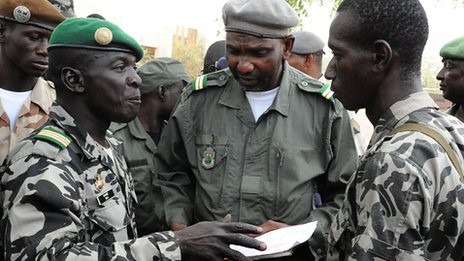
Soldiers in the West African state of Mali have staged a coup due to the failure of the Bamako government to handle a burgeoning rebellion in the north of the country. The coupmakers may be backed by the imperialist states led by the US., a photo by Pan-African News Wire File Photos on Flickr.
International community divided on action in Mali
Numerous international players concerned about emerging jihadist state, but all have different priorities
By Jonathan Manthorpe
Vancouver Sun
January 11, 2013 2:04 AM
The capture on Thursday by Islamic insurgents and their al-Qaida allies of Mali's central city of Konna underlines the international community's inability to block the country from rapidly becoming a terrorist haven.
The capture of Konna from government forces suggests that northern Mali, captured by local separatists and international Islamic extremists in the chaos following a March coup last year, will likely be well-established as an al-Qaida training ground and gathering point before any effective counterattack is mounted.
And even Romano Prodi, the United Nations' Special Envoy for the Sahel, says it won't be until after the end of the rainy season in September that any significant and concerted action can be taken against what is rapidly becoming a jihadist state in northern Mali.
All the usual organizations have been putting their shoulders to the wheel to craft a response since last March 21 when Malian army captain Amadou Sanogo and a group of junior officers launched a coup against President Amadou Toumani Touré.
The UN, the UN Security Council (with three resolutions approving intervention), the African Union, the European Union, and the Economic Community of West African States have all rallied around the flag.
But there are far too many dogs in this fight. And each of them is attracted to different bits of the bone and has very firm ideas about how it should be gnawed.
Then, of course, there are the Americans who have established bases for special forces and drone aircraft in the Sahara and are collecting information. The shift from the drones being information-gathering vehicles to becoming missile-armed attackers, as used so effectively by Washington in Afghanistan, Pakistan, Somalia and Yemen, is, of course, only a matter of a few minutes work.
Even France's new socialist president, Francois Holland, while insisting there will be no French military intervention in Mali, cannot avoid that this whole region is former colonial territory in which Paris maintains national interests.
The French are with the Americans around northern Mali gathering information about the jihadist enclave and maybe more.
But if one wants to put one's finger on a single reason for the distemper that has overtaken the international community in responding to the Mali crisis it has to land on one man, coup leader Sanogo.
He has thuggish tendencies, to say the least, which make it very difficult for international organizations to come to the aid of Mali while he and his feral army are in control.
After ousting Touré in March on the ground that he was botching the long-running fight against the independence movement among the semi-nomadic Tuareg people of Mali's northern Sahara region, Sanogo proclaimed himself the leader of the National Committee for Recovering Democracy and Restoring the State.
He moved swiftly to neuter effective units of the Malian military that were not loyal to him.
While this was going on Tuareg fighters from the Islamist Ansar Eddine and the secular Tuareg National Movement for the Liberation of Azawad surged out of the dessert to capture the major cities of the north, including the fabled Timbuktu.
Along with these local nationalists came another breed of cat entirely, and they swiftly assumed authority over the locals.
These are the jihadists from al-Qaida in the Islamic Maghreb (AQIM), whose roots are in the long civil war in Algeria just over the 2,000-kilometre shared border to the north, and the Movement for Unity and Justice, which seems to be a gathering point for the international al-Qaida followers who are heading for Mali.
These are not people with whom the West - or many other people for that matter -have any basis for conversation. They have introduced public executions for breaches of religious law, amputations for theft and are busy razing those parts of the World Heritage city of Timbuktu that they consider "un-Islamic."
Read the account of Canadian diplomat Robert Fowler's months of captivity by AQIM and it is difficult to escape the conclusion that this is a cultural clash where guns are the only effective diplomatic tool.
Meanwhile in the capital, Bamako, Sanogo's removal of a democratic government and his destructive disdain for Mali's institutions of state brought the threat of sanctions from neighbouring states.
Sanogo made a strategic withdrawal and allowed the formation of a transitional government headed by President Dioncounda Traore whose task was to prepare for new elections in a year.
But Sanogo never relinquished real control and he has the instincts of a warlord. His troops commit atrocities with impunity and are busy recruiting and training militias, including many children.
Sanogo's continuing central power was clear in mid-December, when he arrested then Prime Minister Cheikh Modibo Diarra, forced him to resign on television, and replaced him with Diango Cissoko.
Northern Mali is a bit larger than Alberta. Current plans call for neighbouring states to train the Malian army and put together a force of about 3,000 soldiers to assist in the recapture of the north.
It is not a auspicious enterprise.
Jmanthorpe@vancouversun.com
No comments:
Post a Comment